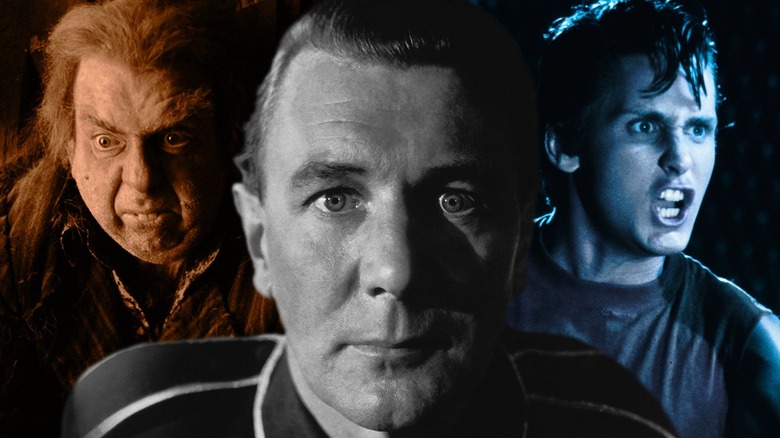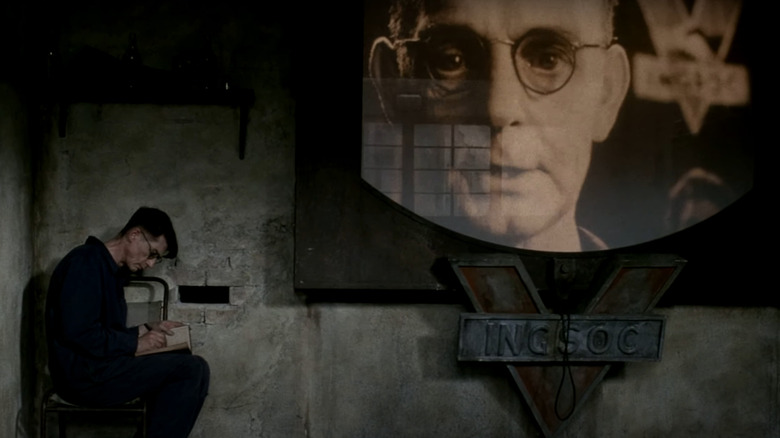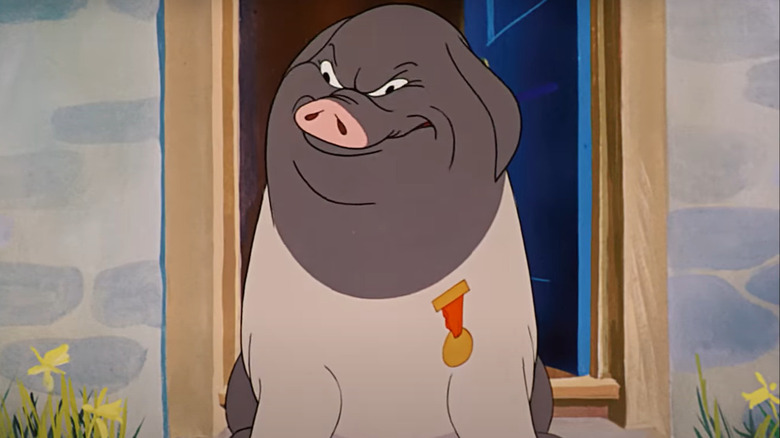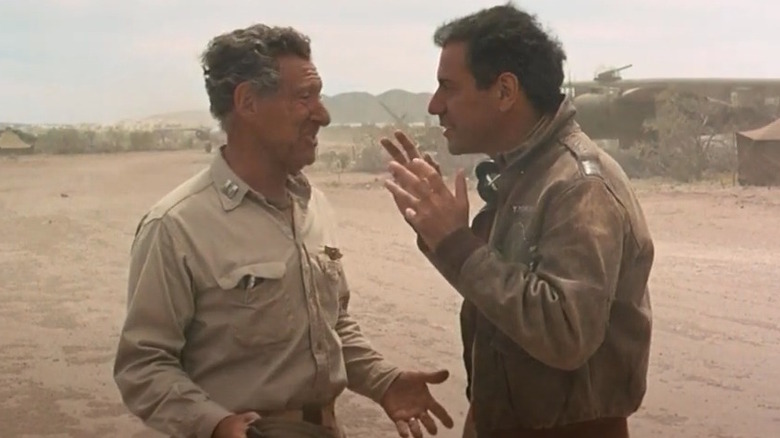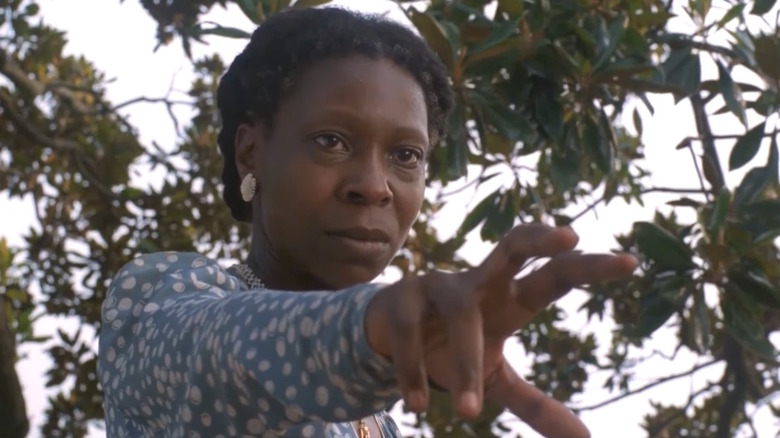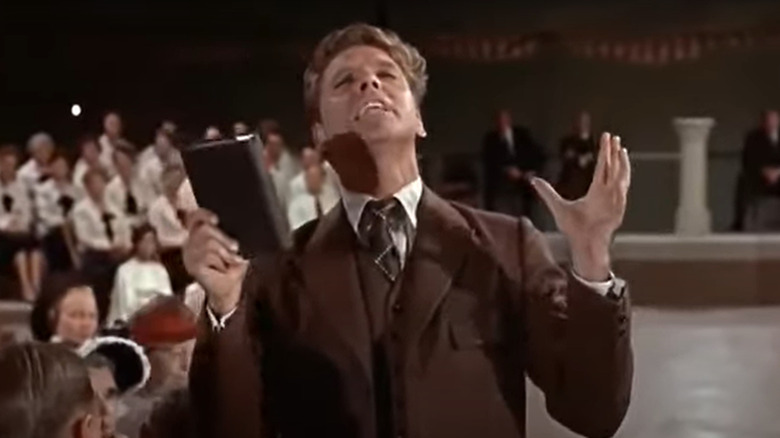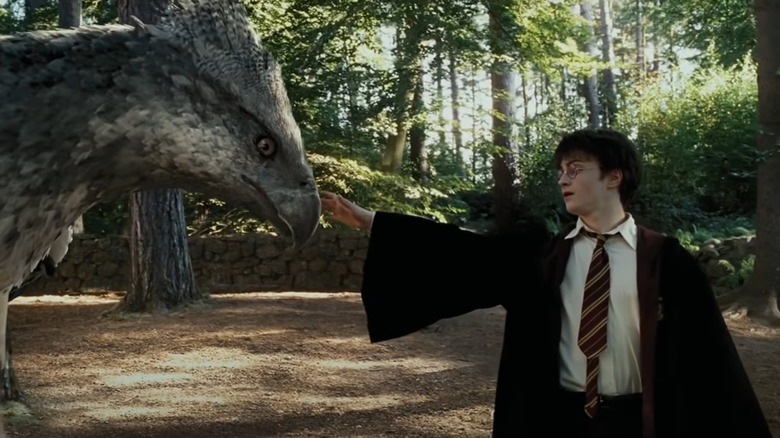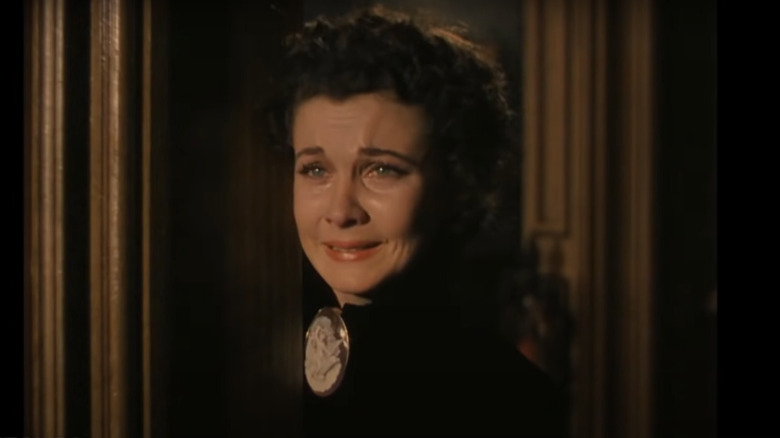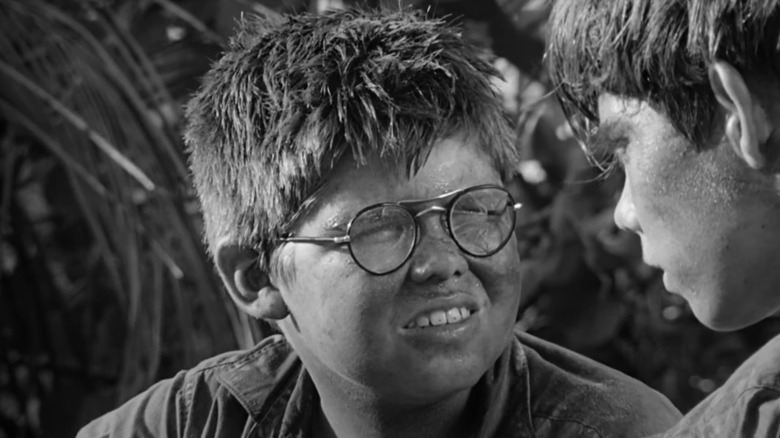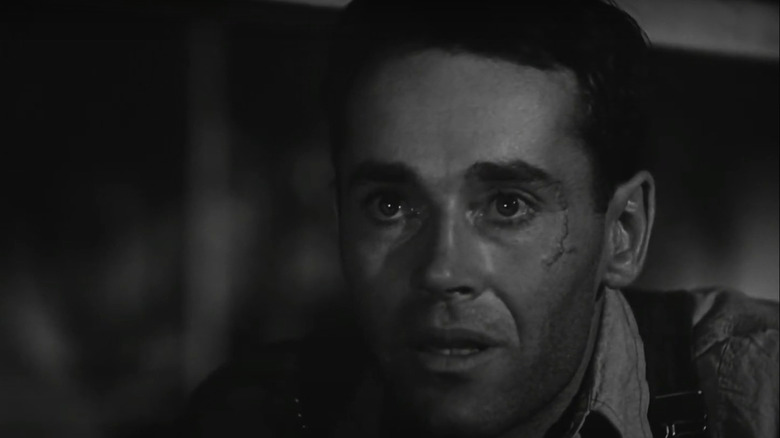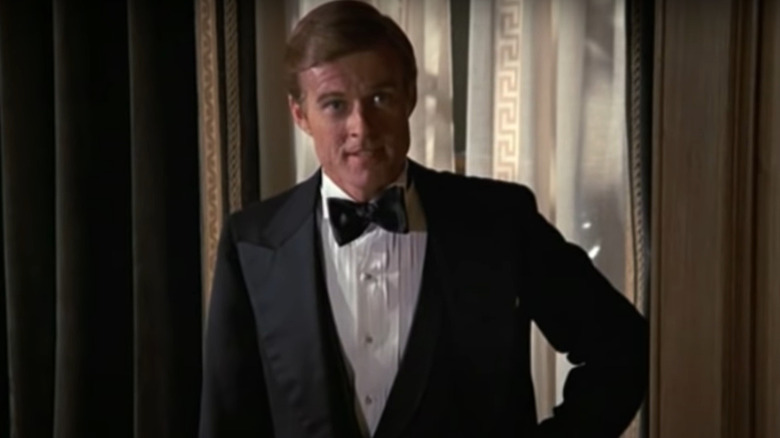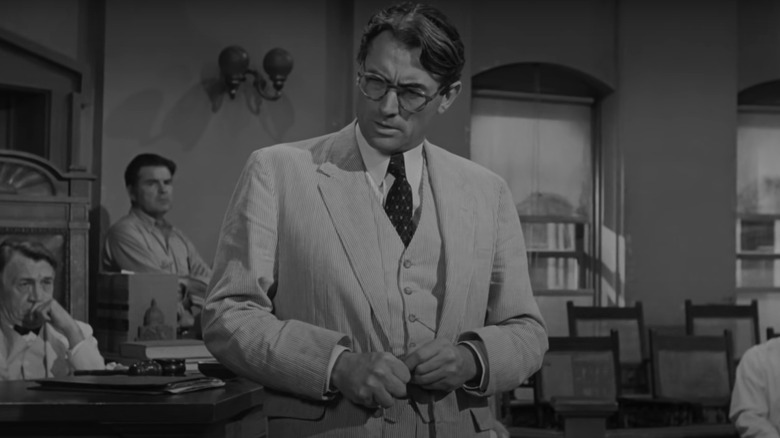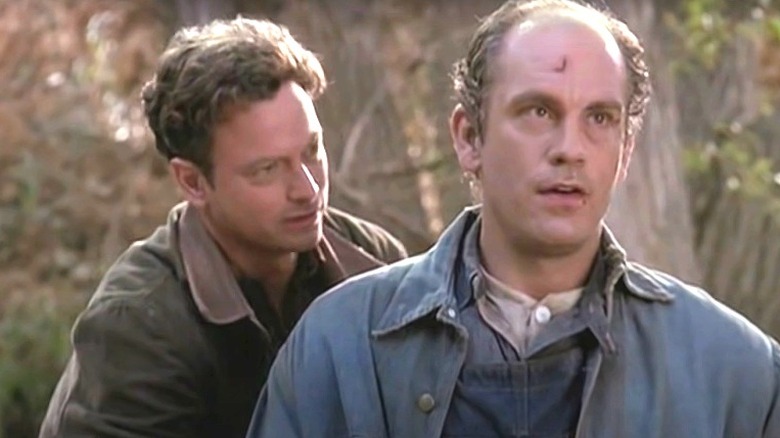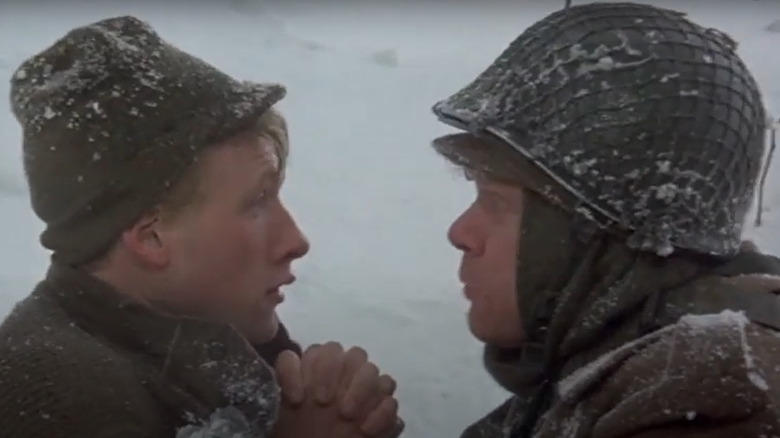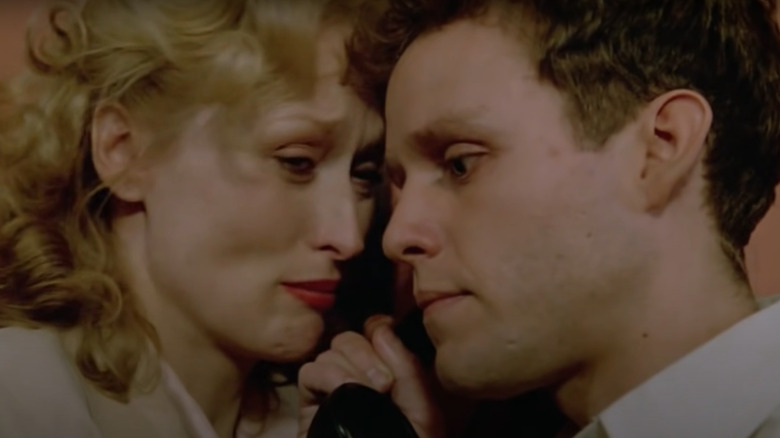14 Fantastic Movies That Are Based On Banned Books
Ever since the printing press was invented, there's been no shortage of instances of books being banned. The reasons for these bans run the gamut from the religious to the political to the moral. Because the standards of decency have changed so much over the centuries, books that were once considered obscene are now socially acceptable, and sometimes, it's the other way around.
While the general intent of banning a book is to prevent readers from engaging with it, it often has the opposite effect. Labeling a book "forbidden" can bring more attention to it. This "Streisand Effect" makes a lot of sense. When the powers that be condemn a piece of media, this only increases the audience's curiosity about why it's so controversial. Not only have bans led to books becoming more popular, but it has also led to them getting the big screen treatment. Hollywood has rarely shied away from capitalizing on controversy, so, understandably, the film industry would see the furor around a contentious book leading to high ticket sales. Let's take a look at some fantastic movies that are based on banned books.
1984
George Orwell's classic dystopian novel, "Nineteen Eighty-Four," is set in a future in which what was once Great Britain is under the totalitarian rule of Big Brother. This oppressive government keeps the population under strict control with constant surveillance, revisionist history, and even more deceptive tactics, all to prohibit individual thought. According to Reuters, because the Soviet Union was not exactly renowned for the freedom that its citizens enjoyed, is it any wonder that "Nineteen Eighty-Four" was banned there until 1988?
There have been numerous adaptations of Orwell's classic, but the best is director Michael Radford's (who also adapted the screenplay) version starring John Hurt and Richard Burton, released in well, 1984. Radford does a spectacular job depicting a hopeless and desolate alternate timeline where conformity is the law, and basic human emotions and thoughts are criminal. Hurt is terrific as the protagonist, Winston Smith, who, despite rewriting history for the Ministry of Truth, secretly desires a freer world. There's never a second that you doubt that this man has been beaten down by the might of enforced congruence.
Animal Farm
George Orwell's other classic work, "Animal Farm," follows a cadre of farm animals living at Manor Farm who are tired of living under the careless rule of Mr. Jones. They hatch a scheme to depose Mr. Jones and the other human owners to establish a community where they can all flourish. However, their efforts are undermined by the conniving pig Napoleon, who just wants to take power for himself. The American Library Association lists many instances of the book being banned around the world. In 1987, the Bay County school district in Panama City, Florida, banned the book. Thankfully, the restriction was lifted when 44 parents filed a lawsuit against the school district.
"Animal Farm" was made into a pretty faithful animated film in 1954, a bold move considering most animated films at the time were geared towards children. The art is stellar and was some of the best non-Disney animation around when it was released. The film generally doesn't shy away from the deeper themes of the source material, giving it a weightier intellectual punch than anything Disney ever put out. However, its one glaring flaw is an upbeat ending that largely contradicts what Orwell originally wrote.
Catch-22
Joseph Heller's satirical war novel, "Catch 22," takes place during WWII and tells the story of Capt. John Yossarian of the U.S. Army Air Forces as he and his fellow soldiers try to keep from going crazy during wartime. The book is an incisive look at the absurdity of war, alternating from lighthearted to tragic as it explores how enemies aren't only those on the other side of a fight. As documented by NBC News in 2020, the Mat-Su Borough School District in Alaska added it to a list of other famous books to be banned from the curriculum, largely because of its violent content.
Mike Nichols (of "Who's Afraid of Virginia Woolf?" and "The Graduate" fame) directed the 1970 adaptation of Heller's novel, which manages to mostly recreate the same balance of wit and agony in the book. Fans of the novel may be a little bothered by the fair amount of material that was cut out to accommodate a feature-length runtime, but what is in the movie — the splendid cast, the dark humor, the horrors of war — is more than enough to demonstrate that Nichols and screenwriter Buck Henry understood the book.
The Color Purple
Released in 1982, "The Color Purple" is a Pulitzer Prize-winning novel by Alice Walker. Set in Georgia in the early 1900s, the story follows a young Black woman named Celie as she describes the brutality of her life through letters to God. The Washington Post reported on a 1997 case wherein the Jackson County School Board in West Virginia voted to ban "The Color Purple," as it was believed that it "could lead to different *** games and violence and other things."
Steven Spielberg took the reins in directing the adaptation of Walker's controversial novel and does a superb job translating the powerful ideas of the source material to the big screen. While the film suffers a tad from Spielberg's characteristic saccharine sensibility, the stunning performances from the cast more than compensate for it. Whoopi Goldberg's portrayal of Celie is particularly stirring, giving the film the majority of its emotional heft and earning her a much-deserved Oscar nod. Oprah Winfrey, as the fiery Sofia, and Danny Glover, as the abusive Albert, are also standouts.
Elmer Gantry
Written by Sinclair Lewis, "Elmer Gantry" takes a darkly comedic look at fundamentalist evangelical Christianity in 1920s America. The title character is a womanizing, alcohol-abusing young man who becomes a Methodist minister despite retaining his various sexual and substance-based vices. Right after it was published, the New York Times reported that it was banned in Boston, and District Attorney William J. Foley warned Suffolk County that stores that sold the book would face serious legal action.
Burt Lancaster knocks it out of the park as the title character, stealing every scene he's in with his portrayal of the sleazy-businessman-turned-sleazy-preacher. Lancaster's versatility is on full display with his ability to pull off a character who can both shock a congregation with fire-and-brimstone verse and make the drunken patrons of a dive bar laugh with a dirty joke. Shirley Jones is also terrific in "Elmer Gantry." The actress established herself playing sweet and innocent characters, but she completely loses herself in the role of a woman out for revenge.
The Harry Potter series
J. K. Rowling's "Harry Potter" novels need little introduction. Ever since "Harry Potter and the Sorcerer's Stone" was released in 1997, the books have attracted countless readers who have delighted in the story of the eponymous young wizard and his adventures at Hogwarts School of Witchcraft and Wizardry. However, according to the Tennessean, St. Edward Catholic School in Nashville, Tennessee, banned the books from its library. The school's pastor, Rev. Dan Reehil, stated that the series could "risk conjuring evil spirits into the presence of the person reading the text."
Despite the controversies generated by the books, their cinematic counterparts have been pretty spectacular. No expense was spared in bringing the magical world of the "Harry Potter" novels to the big screen. There's some inconsistency in style and tone due to the different directors and cast changes. However, the main cast of Daniel Radcliffe, Emma Watson, and Rupert Grint as Harry Potter, Hermione Granger, and Ron Weasley, respectively, are the emotional anchors of the series who kept audiences engaged for over ten years.
Gone With the Wind
Margaret Mitchell's 1936 novel, "Gone with the Wind," spans the American Civil War and Reconstruction. It's the story of Scarlett O'Hara, who hails from a wealthy family in the South that loses everything during the war, and her attempts to win the object of her affection, the charming Rhett K. Butler. The Coloradoan chronicled some of the times "Gone With the Wind" has been banned. While the racist content continues to spur debate (and understandably so), the most surprising bans of "Gone with the Wind" occurred in N*** Germany and Soviet Russia — because of its depiction of people surviving during wartime.
The film's production values, costumes, and attention to historical detail still hold up remarkably well, paving the way for the massive period pieces that still get made. Of course, because of its faithfulness to the book, what doesn't hold up well are the racial elements. After all, the story ultimately asks the viewers to sympathize with a wealthy Southern family during the Civil War. Still, with its touching love story, majestic battle sequences, and epic yet intricate narrative, it's easy to see why "Gone with the Wind" is still regarded as one of the greatest movies of all time.
Lord of the Flies
This classic 1954 novel tells the story of a group of young British schoolboys who st are stranded on an island in the Pacific Ocean after their plane crashes during an evacuation. While the boys initially work together to ensure their survival, they soon begin to fight over who should be in charge and turn against one another. As reported by True North in 2021, the Ottawa-Carleton District School Board voted to remove it from the English curriculum of all of its schools for its alleged themes of "white male supremacy."
While "Lord of the Flies" has been translated to the big screen on two occasions (in 1963 and 1990), the first cinematic adaptation is the superior one. It's not only more faithful, but the child actors playing the stranded boys are phenomenal. There's never a second that you doubt that this is how a group of adolescent males would act while trying to survive on an island without adults. The film is not quite as dark as the source material. However, it remains utterly faithful to its themes of order versus chaos, the corrupting influence of power, and the individual versus the group.
The Grapes of Wrath
"The Grapes of Wrath" is one of John Steinbeck's greatest works as well as one of the most celebrated American books of the 20th century. The novel follows the Joad family as they make their way through an America devastated by the Great Depression. The Joads struggle with a difficult itinerant life as migrant workers while much of the country deals with intense hardship. As detailed by NPR, upon the book's release, it was banned in Kern County, California, where the county board of supervisors denounced its portrayal of their fair county.
Still, the controversy "The Grapes of Wrath" inspired didn't stop Hollywood from turning it into a feature film — and a damn good one, too. Legendary film director John Ford gives us an uncompromising look at the misery and adversity that farm workers had to endure during one of the toughest times in American history, faithfully recreating the sorrow of the book. Grounding the film are the performances of Henry Fonda and Jane Darwell as Tom and Ma Joad. Rarely has Fonda elicited such sympathy without coming off as sappy, and Darwell is perfect as the mother who will stop at nothing to preserve any shred of hope.
The Great Gatsby (1974)
Written by F. Scott Fitzgerald, the great scribe of the Jazz Age, "The Great Gatsby is told through the perspective of Nick Carraway, who meets the charming yet mysterious socialite Jay Gatsby. It's gradually revealed that Gatsby is looking for his past lover, Daisy Buchanan, who just happens to be Carraway's cousin, but is stuck in a loveless marriage. NBC News reported that in 2022, Mat-Su Borough School District in Alaska voted to ban several classic works, including "The Great Gatsby," for its "sexual references."
The novel has been adapted for the big screen several times, the most recent of which is Baz Luhrmann's over-the-top version. However, the best of the bunch is still the 1974 translation, written by Francis Ford Coppola of "The Godfather" fame. Robert Redford is perfect in the role of Gatsby. His immense charm is balanced with a nervous longing for Daisy, who's portrayed almost as wonderfully by Mia Farrow. While the extreme fidelity to the source material robs the film of some of its emotional heft (it sometimes seems like the characters are simply repeating lines from the novel as opposed to depicting their subtext) director Jack Clayton and writer Coppola treat "The Great Gatsby" with the respect it deserves.
To Kill A Mockingbird
Harper Lee's Pulitzer Prize-winning "To Kill a Mockingbird" is set in a small Alabama town during the Great Depression and is told through the perspective of the young Jean Louise Finch, aka Scout. Scout's lawyer father, Atticus, must defend a Black man who's been falsely accused of raping a white woman in a case that has larger ramifications for everyone in town. A recent example of this classic being banned was when the Mukilteo School Board in Everett, Washington, decided to remove it from the ninth-grade curriculum because of its racist elements.
The film adaptation of "To Kill a Mockingbird" was released in 1962, two years after the book was published. Don't let that quick turnaround worry you, as director Robert Mulligan and screenwriter Horton Foote craft the finest translation from page to screen possible. All of the source material's themes (the brutality of racism, the danger of prejudice, and the corruption of the justice system) are faithfully carried over into the film with much of their power intact. However, the real gem of the film is Gregory Peck as Atticus Finch, who becomes the person that everyone imagines when they read the novel.
Of Mice and Men (1992)
Written by John Steinbeck, "Of Mice and Men" follows migrant workers George Milton and Lennie Small as they escape from Weed, California, after Lennie is falsely accused of sexual assault. They search for a new town to work in, only to encounter further troubles. WLOX states that in 2003, members of the George County, Mississippi, school board voted unanimously to remove the book from both the curriculum and from school libraries due to its profanity.
Part of what makes John Steinbeck so enduring is his straightforward prose, which makes his works accessible to almost every reader. That same approach is taken with the 1992 adaptation of "Of Mice and Men," resulting in a lean film uncontaminated by the melodramatic flourishes Hollywood often shoves into big-budget adaptations. Gary Sinise, who also directs the film, is terrific as George, striking just the right balance of ruggedness and heart. Still, it's John Malkovich who steals the show, capturing Lennie Small's childlike innocence, which makes his demise every bit as tragic as depicted in the source material.
Slaughterhouse-Five
Kurt Vonnegut's 1969 novel centers on Billy Pilgrim, who inexplicably gets tossed around through time, revisiting various events from his life. Throughout his bizarre time-traveling escapades, Pilgrim relives his time as a sloppy soldier in the United States Army, his capture by enemy forces, and his abduction by aliens to the distant planet of Tralfamadore. CBS News states that in 2011, "Slaughterhouse-Five" was banned from the curriculum and library of Republic High School in Missouri due to the complaint of one parent.
Anyone who's read "Slaughterhouse-Five" knows that it's practically unfilmable, yet director George Roy Hill (mostly) pulls it off. Michael Sacks is given the unenviable job of playing multiple versions of Billy Pilgrim, seamlessly transitioning from one iteration of himself to another without missing a beat. While the hectic plot of the complex novel had to be streamlined for a feature-length film, Hill capably retains the wry wit and sardonic spirit of the novel, a monumental feat to be sure. Even Vonnegut approved, stating in the preface of his 1972 teleplay, "Time and Timbuktu," that "I drool and cackle every time I watch that film, because it is so harmonious with what I felt when I wrote the book."
Sophie's Choice
"Sophie's Choice" tells the story of a man named Stingo who lives in a Brooklyn boarding house where he meets Nathan Landau and Sophie Zawistowska. Stingo befriends Sophie, who recounts her time in a concentration camp and wrestles with her terrible experiences and the horrible decisions she was forced to make there. The New York Times reports the book was banned in South Africa. While no official reason was given, author William Styron speculated that it may have been its sexual content.
The 1982 film version of "Sophie's Choice" is just as wrenching in its portrayal of the atrocities of history and the tortured love story that came out of them. It intricately navigates the difficult decisions that the characters make throughout the film without overexplaining them, letting the audience grapple with the moral conflicts presented. The casting, though, is the film's real strength. Meryl Streep is stellar as the title character, displaying the full range of human emotions while never resorting to the sentimental theatrics a lesser actress might have employed.
